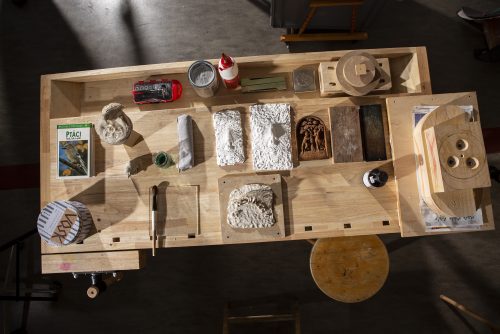
Groupshow
Subterfuge

Install shot. Works by Melle Nieling, Amélie Mckee, and Joanna Wierzbicka
Advertisement

Install shot. Works by Melle Nieling, and Amélie Mckee

Pillow Talk, 2025, Amélie Mckee

A Soul’s Search 2 (screenplay), 2025, Melle Nieling

soft gut lining, 2025, Joanna Wierzbicka

A Soul’s Search 2 (DVDs), 2025, Melle Nieling

Detail shot. Pillow Talk, 2025, Amélie Mckee

Detail shot. Pillow Talk, 2025, Amélie Mckee

Panorama, 2025, Amélie Mckee

Detail shot. Pillow Talk, 2025, Amélie Mckee

Install shot. Works by Melle Nieling

Detail shot. soft gut lining, 2025, Joanna Wierzbicka

Install shot. Works by Amélie Mckee and Joanna Wierzbicka

A Soul’s Search 2 (poster), 2025, Melle Nieling

Detail shot. A Soul’s Search 2 (poster), 2025, Melle Nieling

A Soul’s Search 2 (search), 2025, Melle Nieling
In an age where conspiracy theories and technological paranoia permeate discourse, the boundary between justified concern and irrational fear grows increasingly blurred. These three artists probe this territory by presenting works that embody mechanisms of deception and surveillance.
Melle Nieling constructs an elaborate fiction around a film that never existed, crafting its material traces, such as posters, DVD cases, and screenplay, until the phantom movie feels as real as any other film. Their practice reveals how easily we can be convinced of something’s existence through its artifacts, mirroring how the accumulation of information in the data age fosters conspiracies.
Amélie Mckee’s proposed sculptures continue her ongoing investigation into antenna making and its peripheral subcultures. Drawing from both scientific research and esoteric traditions, her works present hybrid entities that reference orgonite artists and related cultural phenomena. Her chimeric technologies, part ritual object, part surveillance tool, embody our cultural fears about evolution and technological determinism. Mckee’s work renders visible the hidden forces of technology that drive our deeper emotional drives.
Joanna Wierzbicka’s soft, flesh-like sculptures present bodies in constant adaptation, hovering between organic and artificial, familiar and alien. These speculative appendages, imagined for survival in hostile environments, give form to our collective anxieties. Like the fictional organisms of conspiracy theories, they suggest a future where adaptation becomes a kind of camouflage. Her holobionts blur the boundaries between self and environment, organism and technology, raising questions about what forms of transformation survival might demand in an ever-shifting world.
Together, these works create a hall of mirrors where paranoia meets confirmation, where the tools of deception become the means of survival. The exhibition asks: in a world where everything can be fabricated, how do we distinguish between legitimate concern and manufactured fear?
Melle Nieling




